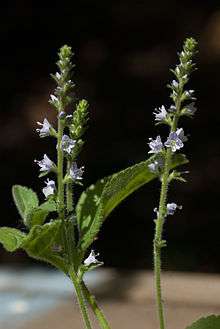Veronica officinalis
| Veronica officinalis | |
|---|---|
| | |
| Scientific classification | |
| Kingdom: | Plantae |
| (unranked): | Angiosperms |
| (unranked): | Eudicots |
| (unranked): | Asterids |
| Order: | Lamiales |
| Family: | Plantaginaceae |
| Genus: | Veronica |
| Species: | V. officinalis |
| Binomial name | |
| Veronica officinalis L. | |

Veronica officinalis (heath speedwell,[1] common gypsyweed,[2] common speedwell, or Paul's betony) is a species of flowering plant in the plantain family Plantaginaceae. It is native to Europe and western Asia. It has been introduced to North America and is widely naturalised there.
It is a herbaceous perennial with hairy green stems 10–50 cm long that cover the ground in mats and send up short vertical shoots which bear soft violet flowers. The leaves are 1.5–5 cm long and 1–3 cm broad, and softly hairy.
It flowers from May until August.
Cultivation and uses
This speedwell grows in fields and takes hold in areas that have been disturbed. It is a potential weed if its seed gets into collections of agricultural seed, such as alfalfa. Historically the green parts of the plant have been used medicinally for coughs, otitis media, and gastrointestinal distress. The plant is rich in vitamins, tannins, and the glycoside aucuboside. Aucuboside, which is also found in many other Plantaginaceae species, is thought to have anti-inflammatory properties. Extracts are widely sold as herbal remedies for sinus and ear infections.
The slightly bitter and astringent taste and tea-like smell of speedwell led to its use as a tea substitute in 19th-century France, where it was called thé d'Europe, or "Europe tea." The French still use this term as a name for speedwell. Veronica officinalis herb has been used in the traditional Austrian medicine internally (as tea) for treatment of disorders of the nervous system, respiratory tract, cardiovascular system, and metabolism.
References
- ↑ "BSBI List 2007". Botanical Society of Britain and Ireland. Archived from the original (xls) on 2015-02-25. Retrieved 2014-10-17.
- ↑ "Veronica officinalis". Natural Resources Conservation Service PLANTS Database. USDA. Retrieved 29 July 2015.
External links
![]() Media related to Veronica officinalis at Wikimedia Commons
Media related to Veronica officinalis at Wikimedia Commons